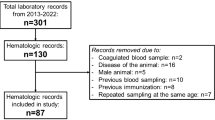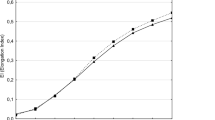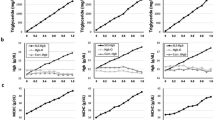Abstract
WE wish to report the finding of abnormal hæmoglobins in two species of monkeys. The monkeys had been shot in the Uganda Protectorate as part of another investigation and their blood has been subject to paper strip electrophoresis. At first lysed whole blood was used, but later larger specimens were collected and hæmoglobin solutions prepared. Hæmoglobins which behaved on electrophoresis like human AA hæmoglobin solutions were taken as the normal reference point.
This is a preview of subscription content, access via your institution
Access options
Subscribe to this journal
Receive 51 print issues and online access
$199.00 per year
only $3.90 per issue
Buy this article
- Purchase on Springer Link
- Instant access to full article PDF
Prices may be subject to local taxes which are calculated during checkout
Similar content being viewed by others
References
Raper, A. B., Brit. Med. J., [i, 1285 (1957)].
Rucknagel, D. L., Page, E. B., and Jensen, W. N., Blood, 10, 999 (1955).
Edington, G. M., Lehmann, H., and Schneider, R. G., Nature, 175, 850 (1955).
Author information
Authors and Affiliations
Rights and permissions
About this article
Cite this article
JACOB, G., TAPPEN, N. Abnormal Hæmoglobins in Monkeys. Nature 180, 241–242 (1957). https://doi.org/10.1038/180241a0
Issue Date:
DOI: https://doi.org/10.1038/180241a0
This article is cited by
-
Haemoglobin Polymorphism in the Rhesus Macaque
Nature New Biology (1972)
-
Hemoglobin types of gibbons and leaf-monkeys
Primates (1970)
-
Hemoglobin variation in macaques
Primates (1970)
-
Electrophoretic Patterns of Macaca mulatta and Macaca nemestrina Hybrid Hæmoglobin
Nature (1963)
-
Hæmoglobins in Monkeys
Nature (1958)
Comments
By submitting a comment you agree to abide by our Terms and Community Guidelines. If you find something abusive or that does not comply with our terms or guidelines please flag it as inappropriate.



